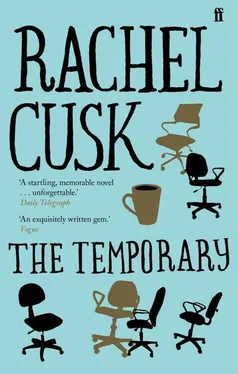Rachel Cusk - The Temporary
Здесь есть возможность читать онлайн «Rachel Cusk - The Temporary» весь текст электронной книги совершенно бесплатно (целиком полную версию без сокращений). В некоторых случаях можно слушать аудио, скачать через торрент в формате fb2 и присутствует краткое содержание. Год выпуска: 2013, Издательство: Faber & Faber, Жанр: Современная проза, на английском языке. Описание произведения, (предисловие) а так же отзывы посетителей доступны на портале библиотеки ЛибКат.
- Название:The Temporary
- Автор:
- Издательство:Faber & Faber
- Жанр:
- Год:2013
- ISBN:нет данных
- Рейтинг книги:5 / 5. Голосов: 1
-
Избранное:Добавить в избранное
- Отзывы:
-
Ваша оценка:
- 100
- 1
- 2
- 3
- 4
- 5
The Temporary: краткое содержание, описание и аннотация
Предлагаем к чтению аннотацию, описание, краткое содержание или предисловие (зависит от того, что написал сам автор книги «The Temporary»). Если вы не нашли необходимую информацию о книге — напишите в комментариях, мы постараемся отыскать её.
The Temporary — читать онлайн бесплатно полную книгу (весь текст) целиком
Ниже представлен текст книги, разбитый по страницам. Система сохранения места последней прочитанной страницы, позволяет с удобством читать онлайн бесплатно книгу «The Temporary», без необходимости каждый раз заново искать на чём Вы остановились. Поставьте закладку, и сможете в любой момент перейти на страницу, на которой закончили чтение.
Интервал:
Закладка:
Nevertheless, the pay he received, like the work he did for it, was automatic, and Ralph would feel the soothing rhythms of his stability even through its worst oppression of him. He would occasionally rise with thoughts of liberation, but feeling himself teeter dangerously on the brink of change would withdraw quickly back into the ever-knitting security of his routine. His only alternative — that of transforming the fixed nature of his work — had been removed before he had even seen out the first month of his employment. He had attempted to infuse his listings with something of his own personality, but to his humiliation Neil had routed out every flourish and confronted him with its lifeless form.
‘What’s this “seminal” lark, then?’ he had demanded once, brandishing a sheet of Ralph’s copy before him. Ralph had lovingly ascribed the term to one of his favourite French films, which was showing on television that week. ‘Is that dirty or what?’
It had been possible to accept his intransigent portion with mild amusement, and now he rarely strained beneath its strictures. His job paid him enough, and was capable, as long as he observed some restraint in his descripition of it, of standing up to the glancing attention he generally received. He did not require, for the time being at least, more than that.
The answering machine was undisturbed, and with the possibility of human intervention more or less ruled out for the evening, Ralph sat down with his beer and drew up the blind with which the distractions of his journey and return had concealed his thoughts. All week he had felt his mind leaning towards the prospect of his oncoming evening with Francine, a process which seemed so to have corralled every part of him in agreement with it that the customary position from which he saw things appeared to have altered. The ballasts of his life, he knew, were too flimsy to protect him from such slippage, and though he had tried, really there was nothing else he wanted to think about. He had negotiated with himself what he saw as a compromise, caging his wild and fluttering thoughts in the stronghold of their one agreed liaison, and he was relieved at least that he had managed to prevent his desires from running ahead to a region of fantasy where they would almost certainly perish.
He had telephoned Francine the day after their miraculous meeting — he saw it as that now, a wonderful and significant chance that had been given to him, like a golden key — and the boldness which his good fortune had inspired had seemed to round up the miscreant possibilities and force them into an orderly march in his favour. Francine had been at home, and had even answered the phone instead of Janice — whom he now treated, in his own mind at any rate, with the greatest mistrust — and he had secured their evening with such an assertion of will, such force, really, that when he had put down the phone after what he had already decided should be the briefest possible conversation, the communication which would least allow for any mistakes on his part and consequently any second thoughts on hers, he had felt quite unlike himself.
She was to come on Thursday, the day after tomorrow, to his flat. He had felt rather churlish about that, but they hadn’t been able to decide on a place to meet on the phone — he had foolishly left it up to her, thinking that was the gentlemanly thing to do, and the poor girl had been quite at a loss — and detecting the approach of a conversational abyss in which he would be bound to undo himself, he had told her to come here. They could have a drink, he said, and then decide together where to have dinner. She had agreed, although not, if he was honest, in a way which particularly betrayed whether she thought it was a good idea or not, and that was when he had commandingly ended the conversation.
He would have to decide on a restaurant in advance, of course, and then casually suggest it to her as if it was a regular haunt, but so far nothing had seemed quite right. He had no car — public transport was out of the question — and besides, after making her come to his house it would seem silly then to go to another part of London. He wrestled once more with the handful of local places he knew, coming inevitably again upon their shortcomings. He never really went to restaurants, in fact. He and his father had always eaten in pubs, and at university he had never had enough money, and now he just didn’t like them much. It was an area in which he felt even less able than usual to take control: he disliked being besieged by choice and felt embarrassed by the waiters, not only because of the strange contract which decreed that they serve him, but because their youthful, insolent faces, their snobbery, their very apparent desire to be mastered, rendered him hesitant and effete. They would invariably find him out, too, becoming deaf when he made his order, leaning forward and saying ‘Excuse me?’ and forcing him to repeat it, always seeming to find something in the loneliness of what he had chosen for himself to eat which merited a smirk and the implication of mockery.
He supposed he could cook dinner himself. He had done that before. The room had grown darker around the circle of lamplight in which he sat. He got up and switched on the overhead light. He would need to cheer things up if they were to spend the whole evening here. He could buy some flowers, and he’d have to clean the bathroom and get some nice soap. He remembered a conversation years ago with Stephen — what was it he’d said? — about what to do when a girl was coming round. Stephen had recited this list, as if he’d read it in a book, for God’s sake; things like leaving letters around with exotic stamps, and what else? Oh yes, some kind of intriguing book lying open on the coffee table — actually, Stephen had said by the bed, but that was out of the question. He had gone too far, of course, talking about half-finished poems on the kitchen table and God knew what else. Ralph laughed aloud.
*
Ralph’s flat was to the north of Camden, in a small labyrinth of identical streets where most of the houses were only two storeys high, like a cloned village. The area was bounded and bypassed on either side by two large roads along which streams of traffic ran, prevented from forging time-saving tributaries through the tiny residential island between them by a number of no-entry signs, dead ends, and tortuous one-way systems. This lack of circulation gave the area a curiously bloodless air, Ralph thought, an atmosphere of blockage which, though he valued the parochial quiet it guaranteed, sometimes made him forget the city which lay around it.
He had chosen Camden without hesitation when he had decided to buy somewhere to live, using the small but still inexplicable amount of money his father had left him. He knew things were probably cheaper elsewhere, but when he was younger he and Stephen had always used to come to Camden, during the half-terms and holidays it had mysteriously been decided he should spend with Stephen and his mother. Stephen’s mother lived in west London, in a white mansion house surrounded by embassies. Ralph could remember seeing the large black cars installed with dark, motionless silhouettes roll silently past the kitchen windows, their bright flags writhing in the breeze. Stephen’s mother was forgetful about money and Stephen would sometimes elicit his ‘allowance’, as it was called, from her twice in one day. Stephen’s allowance, Ralph knew, in fact arrived regularly at his bank from his father, who lived abroad, but if she was party to it Lady Sparks never referred to their arrangement. In her vague way she always seemed rather frightened of Stephen and would rifle nervously in her purse at his request, producing a fistful of notes and offering them to him as if he were holding her at gun-point.
Читать дальшеИнтервал:
Закладка:
Похожие книги на «The Temporary»
Представляем Вашему вниманию похожие книги на «The Temporary» списком для выбора. Мы отобрали схожую по названию и смыслу литературу в надежде предоставить читателям больше вариантов отыскать новые, интересные, ещё непрочитанные произведения.
Обсуждение, отзывы о книге «The Temporary» и просто собственные мнения читателей. Оставьте ваши комментарии, напишите, что Вы думаете о произведении, его смысле или главных героях. Укажите что конкретно понравилось, а что нет, и почему Вы так считаете.












